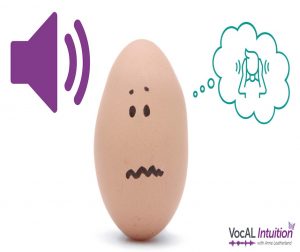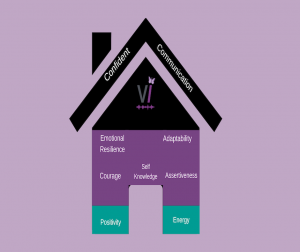I’m thinking about tired voice today, particularly as people have been settling back into their teaching jobs after a long break. If you’re a teacher, a singing teacher or a singing student, then you’ll know what I mean. It depends on how much you’ve been doing during the break. Speaking can be very tiring, as can singing for a long time. This is especially true if you’ve had a break and haven’t been using your voice in the usual way. A tired voice may have less range than usual and feel a bit scratchy, dry and generally lacking in staying power. If your voice is very sore or hoarse, this indicates that you need to rest it straight away and seek medical advice. The same thing applies if your voice does not recover following a cold or virus.
Muscles

Back of the larynx (cut)
The voice is essentially a muscle. In the larynx (voice box) diagram, the red areas are muscles. The Vocalis muscle is inside each of our true vocal folds (cords) and helps us to speak or sing. Just like any muscle, it will tire with over- use and also suffer if we don’t use it efficiently or set it up properly. Think for instance about any of the muscles of the body. If you were to go to the gym suddenly after a long break, then you’d certainly feel it the next day. Those muscles would complain. You’d feel tired or worn out, and it would take time to build up your stamina again. If done properly, it doesn’t really take that much time to get back up to speed. It’s not a good idea though to suddenly go all out at something when you haven’t done anything for some time.
There are also lots of other muscles outside the larynx that are linked to voicing. Overuse and fatigue of these can result in tension that can affect your voice.
Who Can Suffer from Tired Voice?
More or less anyone, but certainly teachers, singing teachers, singers, students, professional speakers. Tiredness can happen at any time. It just depends on how you’re using your voice. Let’s think first of all, about speaking voice. Believe it or not, that often tends to be the culprit. Even if you’re a singer and you’re thinking that you have simply sung too much, It can be useful to look at your speaking voice use. We use our speaking voices far more than we use our singing voices. We use our speaking voices all day to communicate. If you are a singing teacher or school teacher, then you’re using your speaking voice even more so.
Schools and Colleges
In a school or college you will be dealing with a noisy environment from time to time. If you’re raising your voice a lot during the day, especially over noisy students, then you’ll end up with a tired voice. Find alternative ways to get their attention. Also, look at whether you’re using your voice efficiently or not. If you don’t know how to support your voice effectively it’s worth seeking out help. So many working days a year must be lost due to teacher voice issues.
“Soldiering On”
“Oh, I have a cold” or “my voice is sore – I’m going to keep going, because I need to do my job”. This is probably the worst thing you can do. A hoarse, tired voice in this situation will eventually just stop working. I’ve been there myself unfortunately. I was teaching with a bad cold and felt that for my students’ sake, I had to just keep going. Even small amounts of speaking on that voice, let alone demonstrating to people, caused all sorts of problems. I ended up having to take three days of complete voice rest. My voice didn’t get back to normal after that for three weeks. This could have been avoided.
Singing and tired voice
People are already starting to think about Christmas repertoire and rehearsals for concerts. It’s so easy to overdo rehearsals. Spending too long at the same thing doesn’t to help anyone, especially if it’s a difficult piece of repertoire. This is equally true if you’re going for a job or an audition.
Singers also encounter issues just by choosing the wrong repertoire. It’s not a case of what song you like; it’s about what suits you as a performer and matches your technical abilities. Without the technical underpinning you are unlikely to be able to communicate something as effectively as you want to. Additionally, avoid trying to compensate for a tired voice. If you can’t rest, find alternative ways of expressing what you need.
If you are a teacher and set a singer something that is too far out of their comfort zone or comfortable range, then that student will struggle with their voice. This is especially important to remember with young voices, which are developing and simply can’t do the same things as older voices. Here’s a great book if you’re interested in finding out more about young voices.
Copying
This tends to be the case with younger singers or those who’ve had very little training. Look out for that. Don’t just copy. Even if what you do sounds very similar to what you hear another singer do, that doesn’t necessarily mean you’re doing the same thing. You could be tiring, straining and causing problems for your voice. Get some advice from somebody who knows. They will show you how to make certain sounds safely and tell you what will suit your voice and your stage of development. At the end of the day, we all have to go through a learning process and gradually build skills that allow our unique voice to come out.
General voice use
Very often we don’t notice the most damaging thing and that tends to be our social voice use. For instance, when speaking over very noisy crowds, going to the bar, ordering a drink, shouting across to our friends because we can’t be heard over the very loud music. You might work in an office or factory that’s a noisy and again that can cause you problems. It’s about finding ways to avoid these strains.
What can you do to help yourself avoid a tired voice?
- Keeping a voice use diary is a very good start and then you can see where most of the problems are occurring.You can prioritize certain kinds of voice use. That means that you can avoid a tired voice and be self monitoring. Look out for my next FB live where I’ll be discussing this. I’ll also be adding some free downloads to this site to help you.
- Stay well hydrated by sipping water through the day. Avoid too much tea, coffee, alcohol or caffeinated soft drink. If you use your voice a lot you should also be steaming it two or three times a day (half an hour before singing/speaking).
- Adopt “smart practice”. Do a little and often. Think about how are you going to tackle difficult areas and find ways that you can build on a little bit each day. If you keep trying to do something that’s beyond your comfort zone without guidance, then you will tire and possibly do damage.
- As a teacher, I have to monitor my voice every day. I need to warm it up to avoid a tired voice later. I recommend the One Minute Voice Warm Up app by Vocal Process and Speech Tools. You can get it here for iOS or here for Android. It does what it says on the tin! Also, remember that warm up is just that, not an extensive work-out. You shouldn’t be tired before you start.

One Minute Voice Warm Up
- If your voice is tired, REST it. That includes speaking and singing. Avoid whispering as it is unhelpful. If you must speak use a quiet, normal voice.
- If you have to project in a large hall or noisy space a microphone can really help. This applies for sports trainers (use a head mic) and those working outside as guides (you can get a good small speaker and a mic quite reasonably these days).
-
Have look at the BVA, that’s the British Voice Association website. There are some really good leaflets to download that will tell you a lot about how to look after your voice. They also run great conferences and events for voice professionals.
Questions?
I’m available for questions at any time on this site or through the Vocal intuition Facebook page. You can find me on Twitter as well. If you are interested in catching up with me for a one to one session, then do get in touch because that’s the way I can work with your particular voice.

Why not book a FREE discovery call? (Limited availability).




